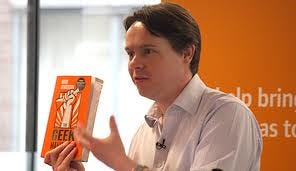Is reading journal articles of any use to the beginning teacher?

In response to a blog post of mine about reading academic journals, a former student wrote this:
I rarely had the patience with journal articles as a student, and had I realised back then that I wouldn't be expected to read widely as a practitioner I would possibly have used that as an excuse to not plough through.
Why do we ask our students to read journal articles? What does ‘keeping up with the research’ offer the practising teacher?
Mark Henderson, author of The Geek Manifesto, has little doubt about the importance of ‘keeping up with the research’. Speaking on Radio National’s ‘The Science Show’ yesterday (July 21st) , he said:
… there’s little thinking about how [a] scientific approach could contribute to creating better policy, producing evidence through some of the tools of science, randomized controlled trials, for example..., to really show whether different interventions work or not, and we don’t do that … I might highlight an example of where we might use a more evidence-based approach, and that’s the teaching of reading. … If we were to do a proper randomized control trial of phonics versus other forms of teaching children to read, we would be able to actually answer that question [of what works in the teaching of reading].
Wouldn’t it be grand if the tools of science could tell us what works and what doesn’t in the classroom!
I don’t think they can, though.
Last week, I had conversations with two pre-service teachers who, co-incidentially, had had the same English teacher when they were in Year 7. Each described to me the no-nonsense approach of the teacher, someone with high standards and an intolerance of any excuse offered when a student wasn’t able to finish the assigned reading. One of the pre-service teachers told me how that teacher had turned around his whole attitude towards reading, and how by the end of the year he was reading novels at the rate of one a fortnight. The other described how he spent the year refining his strategies of disguising his inability to finish a book.
Donald Schon tackles this issue in his book Educating the Reflective Practitioner.
The professional schools of the modern research university are premised on technical rationality. Their normative curriculum, first adopted in the early decades of the twentieth century as the professions sought to gain prestige by establishing their schools in universities, still embodies the idea that practical competence becomes professional when its instrumental problem solving is grounded in systematic, preferably scientific knowledge. Because the unique case falls outside the categories of existing theory and technique, the practitioner cannot treat it as an instrumental problem to be solved by applying one of the rules in her store of professional knowledge. The student cannot be taught what he needs to know, but he can be coached.
If Schon is right (and I think he is), what then is the purpose of asking our students to read academic journal articles?
While journal articles will never tell us the answers to questions like ‘what is the best method for teaching reading?’ or ‘how can I best control my classroom so that my students learn?’, they will help the practising teacher in other, deeply important, ways.
First of all, the best of them will help a practising teacher to see more. The ideas he or she finds in good journal articles help make visible what the day-to-day, externally-generated pressures of the moment can hide. The complex and often challenging world of the classroom can seem, especially to the beginning teacher, a place beyond comprehension, an unnatural world where motivations are malevolent or mysterious, confusions are obstacles, and where ideals are luxuries best quickly abandoned. Talk in the staffroom tends to re-inforce this unhelpful view of things. ‘The students don’t want to learn. They’re just hedonists. There’s no point in trying to teach them anything.’ Good educational ideas help us to see a bigger, more encouraging, picture.
Secondly, journal articles (the useful ones) help us to act. They give us access to potentials and agency without which we can feel buffeted around by forces beyond our control. When we see more about the reality of what’s in front of us, we’re more likely to have more useful ideas about what to do in what Schon calls ‘the indeterminate zones of practice [which] escape the canons of technical rationality'.
And thirdly, reading good journal articles helps us to connect. Through reading, we become joined to a community of thinkers; we are encouraged (given courage) through the knowledge that others have insights about our predicaments and challenges.
*****
Donald A. Schon Educating the Reflective Practitioner: Toward a New Design for Teaching and Learning in the Professions (Higher Education Series) Kindle edition





